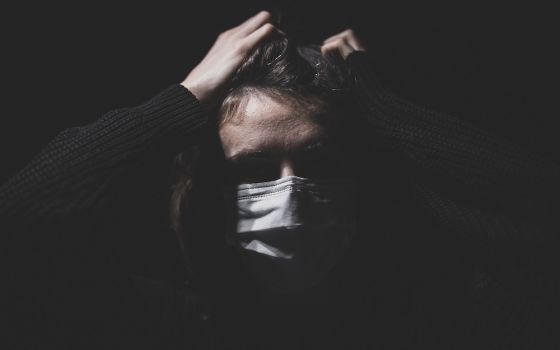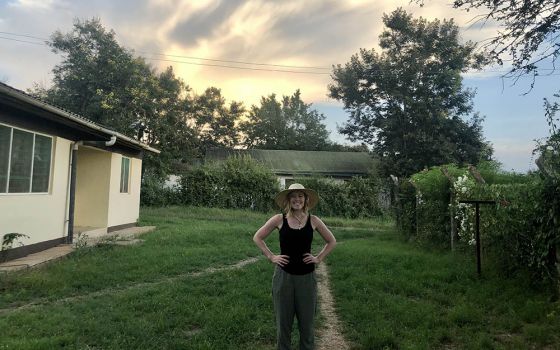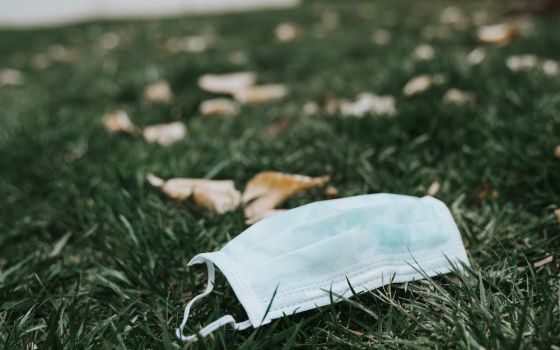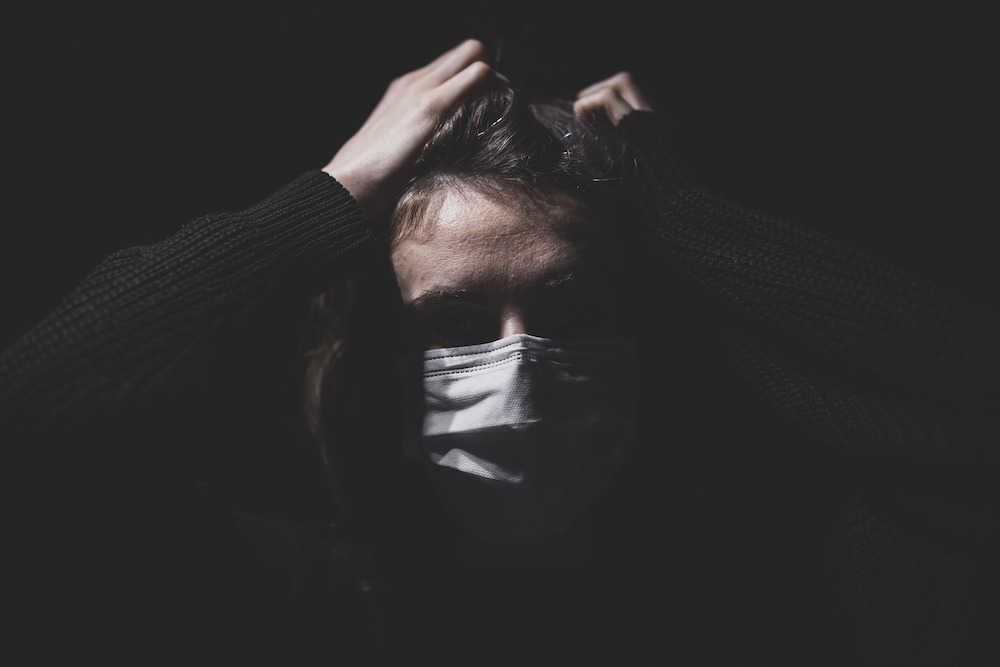
A recent poll by the American Psychological Association, presented in a report called "Stress in America," called the experience of living through the pandemic a "collective trauma." (Pixabay/Engin Akyurt)
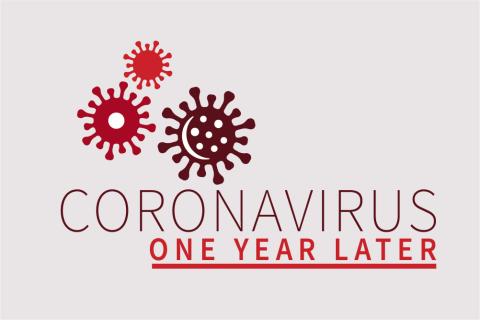
(NCR, GSR logo/Toni-Ann Ortiz)
Kaden Mecca and Kelly McClatchy, two eighth graders at St. Patrick School in Malvern, Pennsylvania, are so done with the virus.
Yes, they are grateful that family members have mostly stayed healthy. Kelly said that she thinks this year has brought her class a lot closer, "having to work it out all together and figure out new ways to do things."
While she can spend socially distanced time outside with her friends, she loves to talk to them face-to-face, and she just can't do that right now, said Kelly. Nor can she see her large extended family.
"I do feel anxious, a lot, not able to go to them for everything, to lean on them for problems I'm having, or hanging out when I need things," she said. "I'm very anxious to get out of this situation and to be able to hang out with them more and have parties like we used to. But we're trying to find ways to have fun as it is."
Kaden is diabetic, he said, so he has had to be extra careful. Though he's still got his pre-COVID-19 Xbox routine with his friends, and can talk with them on the phone, he really wants to be outside with them, shooting baskets. "That's different. So hard," he said. "I can't do that now."
Kaden and Kelly aren't alone in missing pre-pandemic social connections and expressing longing for the life they had before coronavirus. In fact, because they have been able to attend school this whole academic year, they are probably doing better than many.
Americans of all ages are experiencing a pandemic of stress-induced anxieties, potentially lasting longer than the viral one, say experts. That's in large part due to the sadness, isolation and uncertainty of a year battling a national (and international) outbreak of COVID-19. A recent poll by the American Psychological Association, presented in a report called "Stress in America," called the experience a "collective trauma."
Assessing the effects of the pandemic, in which he included "despair," Pope Francis himself said that the world is "seriously ill."
Advertisement
The good news in the midst of the gloom? Congregations, families, friends and school personnel can help promote wellness and healing, suggest experts. But first, some say, it's essential to recognize the depth of the problem.
"We have not done well with trying to figure out how to address the problem of mental health yet. And this is going to be an ongoing pandemic as well," said Usha Tummala-Narra, a professor of counseling psychology at Boston College. "This type of isolation is profoundly impactful, in a negative way."
Dean McKay, a professor of psychology at Fordham University, said research he's done with Canadian colleagues has identified five major areas of COVID-19-related stress. They include worries about the danger of contamination (concern about being infected), socio-economic stress, and traumatic stress suffered by people who have had the disease or had ill relatives or been first responders, like health care workers. The pandemic may also trigger obsessive "checking" behavior, he said, like constantly washing one's hands. Researchers have also tracked a rise in xenophobia, fear based on inaccurate presumptions that people coming into the country are carrying dangerous diseases.
Alcohol consumption has also spiked during the pandemic, as has other substance abuse, added McKay. These behaviors are likely to linger after the pandemic is over, he noted.
The impact this year has had on children is particularly concerning, suggests a recent story in U.S. News & World Report.
The effect of the pandemic on young people, said Tummala-Narra, crosses all class and ethnic lines. Young people are experiencing breaks in their learning and socializing. Growing numbers of adolescents suffer from significant depression and suicidal thoughts, she said.
Though expressing some frustration at the way safety protocols have impacted their friendships and family relationships, Kelly and Kaden may have fared better this year than many students who studied virtually or in hybrid classrooms.
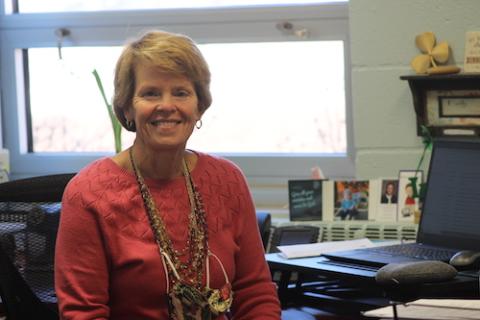
Principal Patricia O'Donnell of St. Patrick School in Malvern, Pennsylvania (Elizabeth Eisenstadt Evans)
That's because Catholic elementary schools in the Philadelphia area, like many school systems around the country, have been open since late August. A growing body of research suggests that in-person learning, even if practiced with social distancing and strict safety rules, is a healthier environment for younger learners than either hybrid or virtual classes.
Commending the way that parents with kids enrolled in the suburban school have worked together with staff, Principal Patricia O'Donnell said that St. Patrick's has only had one case of a student testing positive, with no in-school transmission. "I know that for some students, there was fear and nervousness about catching the virus," she said, noting that at the beginning they had to do a lot of reinforcement of virus protocols and reassurance. But "being in person has just been an incredible gift to us."
At the beginning of the school year, said school counselor Amy Musumeci, she thought she would have more calls for counseling support for children. But it wasn't until around January that they started to pick up, particularly among the parents of middle-school children. "I think that they were excited to come back in the fall, but then they realized school was not exactly as it was, as far as being able to do projects together."
Some of the outlets children normally use, like socializing with their friends or playing sports, were restricted because of safety concerns.
"It's been a juggling act for the kids, even the young ones," said Musumeci. "They show it differently, but they grapple with it too." Younger children might act out, lashing out at teachers, parents, or other students. Older ones might show symptoms that aren't as obvious, like stomach issues and headaches, she said.
In response to the increase in anxiety among students and parents, Musumeci did a unit for sixth-graders on stress: how it works in the brain, how it affects the body and how to cope with it. She's encouraging parents, "just to keep the conversation going. Make that time to connect and check in because it's hard for everybody."
For the kids, she said, this year has been all about fostering resilience and coping skills — as well as a lesson about what they can and can't control.
When it comes to adults, pervasive inequality can have a negative effect.
Given its outsized impact on minority communities and other vulnerable populations, the pandemic has also amplified other stresses they face daily, and raised disturbing questions, said Tummala-Narra. "Depending on which subgroup we're talking about, at any given point, it raises the question of who, whose life is valued, in which community is valued, who's considered an American, who has rights, basic human rights," she said.
The Household Pulse Survey done by the federal government last year revealed significant rates of anxiety and depression, particularly among young and middle-aged adults. These feelings are "likely to linger after the pandemic. This is not the kind of thing that's going to go away quickly. It's just going to take a long time for people to put it back together," said McKay, the Fordham psychology professor.
At St. Patrick Church, which sits next to St. Patrick School, Fr. Christopher Redcay and his associate pastor shepherd approximately 2,900 families in this middle and upper-middle class Chester County town. "From the very beginning, he said, he and his staff have worked to "meet the fear that people carry when they walk in the door," he said.
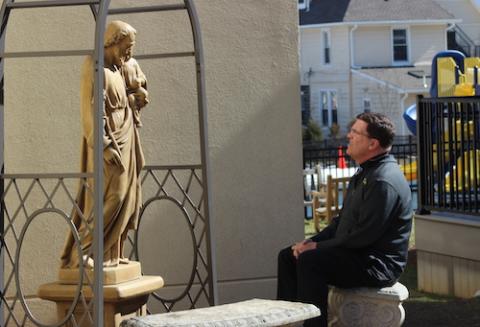
Fr. Christopher Redcay, pastor of St. Patrick Church in Malvern, Pennsylvania, looks to a statue of one of his favorite saints, St. Joseph, outside of the parish office. (Elizabeth Eisenstadt Evans)
His primary challenge, he said, was being present to families in distress when he can't be with them in person. "It's been a lot of phone calls, just assuring families of God's compassion and presence for them."
While the emotions can feel overwhelming, there are a multitude of tools to deal with them, say experts.
"Our first line of defense is knowledge," said McCay.
Making sure you have accurate information about the risk of infection, and how well safety measures can protect you is crucial, said McCay. It's also helpful to consider how much uncertainty you or a friend or loved one can tolerate in a period when stress is already amped up. "If you find yourself curtailing your activities, it's important to think of other things you can do safely," he said.
And make sure to manage your media consumption. He advises limiting cable news consumption to one hour a day.
Additional coping strategies can include activities like exercise, meditation, mindfulness, reframing, relaxation, distraction and any other cognitive or behavioral strategies that are found to alleviate stress and/or negative emotions, according to Rachel Annunziato, also a professor of psychology at Fordham University.
Religious organizations, like parishes, can have a positive impact, said Tummala-Narra. "They help people navigate a very confusing world, fostering a sense of connection and hope for the future."
She suggested that people of faith reach out particularly to young people who might be grappling with racial and economic injustice, as well as older adults who may be isolated. Noting that she has spoken with people who can't find counselors right now, she encourages people with appropriate credentials and experience to come out of retirement to lend a hand.
Clergy, who are also frontline responders, have lent a hand. The Jesuit priests she knows at Fordham have remained "deeply engaged" with students, Annunziato said in an email interview, with one colleague offering students regular walks at the New York Botanical Garden nearby.
In his Malvern parish, Redcay has found comfort and sustenance for this trying time in community, he said, particularly the support of church staff. "I'm not doing this alone. God has placed great people in my life, so we lean on each other."
Without hesitation, like the preacher he is, he draws the spiritual moral. When life is going smoothly, he said, people tend to act as though they can manage everything on their own. But that's where faith comes in. In all circumstances, even these, believers have a choice.
"God is present. What can we learn from his poverty, his faithfulness to us? Will we allow ourselves to be accompanied?"




